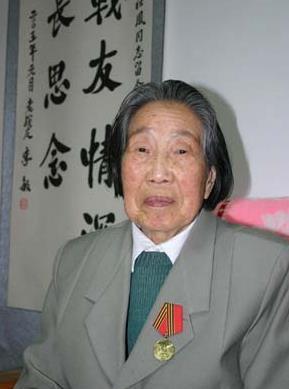In people's impressions, men have always been in a dominant position in the long river of our country's history. But there are also many women who do not let their eyebrows shave, they use their own efforts to leave a name in history, and some even influence the development trajectory of Our country's history.
As the saying goes, women can hold up half the sky. In china's modern history, there are many female Haojie who, for the sake of the motherland, shouldered the barrel of a gun, rushed to the front, threw their heads and spilled blood. Such as Tang Qunying, one of the founders of the Republic of China, Jiang Jie, an underground worker, Zhao Yiman, an anti-Japanese hero, and Zhuang Feng, a "female master in the army".
Zhuang Feng was born in 1919, a native of Jiaoxian County, Shandong Province. At the age of 17, in order to resist the Japanese invaders and defend the motherland, Zhuang Fengyi bid farewell to his family without hesitation and embarked on the road of revolution.

At that time, Zhuang Feng carried his son behind his back and joined the Northeast Anti-Japanese League, becoming a female soldier in the third regiment and company of the second division of the Seventh Army of the Anti-Japanese Alliance. It was not until the spring of 1937, when the superiors decided to leave the Raohe Mountains and go to the plains to open up new guerrilla zones, that the female fighters in the troops were left in the rear, and Zhuang Feng was among them.
While working in the rear, Zhuang Feng and other soldiers washed and mended the clothes of the troops who came down from the front line to rest, and took care of the wounded. In that era when drugs were scarce, many warriors had to use salt water to wash their wounds in order to prevent them from becoming inflamed. Every time he helped the wounded to clean their wounds, Zhuang Feng couldn't help but cry.
Due to the enemy's frenzied encirclement and suppression of the enemy's confrontation with the United States, Zhuang Feng and his comrades-in-arms often stayed in the mountains and forests overnight, climbed the ice and lying in the snow, dug wild vegetables, nibbled on tree bark, ate grass roots, and even used cotton sleeves to fill their hunger. In that arduous years, Zhuang Feng experienced many hardships and composed a heroic and heroic revolutionary epic.
In addition, Zhuang Feng was also the platoon leader of the Northeast Anti-Japanese Coalition Army's Teaching Brigade, that is, the independent 88th International Brigade of the Infantry of the Soviet Far East Red Army, and the first batch of female paratroopers in China's history, so she was also praised by her comrades as "female master in the army".
In 1941, the superiors informed all the commanders and fighters of the Soviet North Camp to go to Boli for a month-long airborne training, and Zhuang Feng and 12 other female fighters also participated in this training.
The training is very hard, and the warriors must not only overcome their fear of the sky, but also have the determination to sacrifice themselves at any time. In just one month, Zhuang Feng and the other warriors mastered all the techniques of airborne landing. Even the Soviet instructor Majoel, who trained them, said:
"You black-haired, snouted Chinese women are so powerful!" Bravely completing the airborne training task like a man is really good!
”
In this way, Zhuang Feng and more than 20 other female fighters of the Anti-Japanese Coalition won the title of "China's first female skydivers".
After the founding of New China, Zhuang Feng returned to the northeast to work. She has worked in water conservancy, women's committee, propaganda, education, management and other positions, with rich work experience.
In 1964, Zhuang Feng was transferred to Jilin Province to work, and successively served as the deputy director of the Propaganda Department of the Changchun Municipal Party Committee of Jilin Province and the director of the Changchun Municipal Health Bureau.
In 1983, with the approval of the Jilin Provincial Party Committee, Comrade Zhuang Feng officially left his post to recuperate. Soon after, the central authorities approved that Comrade Zhuang Feng enjoyed the treatment of the main department level and the medical treatment of the deputy provincial level.
Zhuang Feng's life can be described as ups and downs, but she has used her own efforts to create heroic achievements in the mighty mountains and rivers, and has won the respect of the international community. She was invited to attend the 50th anniversary of the founding of The People's Republic of Korea and was awarded the Russian National Medal for the 50th Anniversary of the Victory in the Great Patriotic War and the 60th Anniversary of the Victory in the Great Patriotic War.
On February 17, 2011, this "military girl" died in Changchun due to illness at the age of 92. In accordance with her last wishes, her family did not carry out the farewell ceremony of the body, and combined the ashes of her and her husband Comrade Liu Tieshi and scattered them on the Jingyue Mountain in Changchun to return to nature.
Heaven and earth are heroic, and the thousand autumns are still awe-inspiring. Comrade Zhuang Feng's life was a life of revolution, a life of struggle, and a life of serving the country and the people. As a woman, she is a mother, a wife, and a good daughter of the motherland and the party. She is the pride of the motherland and the backbone of the nation. Finally, salute to Comrade Zhuang Feng!